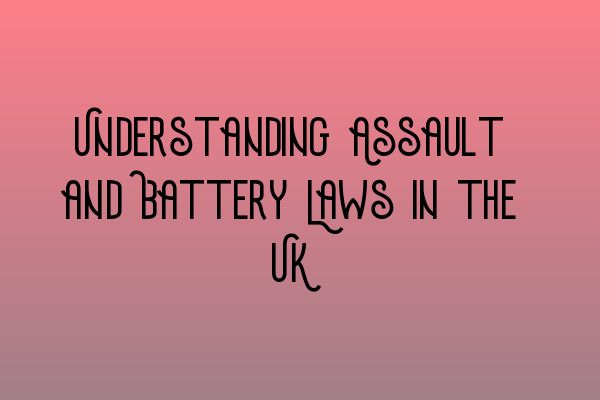Understanding Assault and Battery Laws in the UK
Assault and battery are two commonly used terms in criminal law, but what exactly do they mean? If you find yourself in a legal situation involving assault or battery, it is important to understand the laws surrounding these offenses in the UK.
Assault and battery are often used interchangeably, but they actually refer to two separate offenses. Assault refers to the act of intentionally causing someone to fear the infliction of immediate, unlawful force. On the other hand, battery refers to the intentional application of unlawful force to another person.
In simple terms, assault is the threat of physical harm, while battery is the actual physical contact or harm caused. It is important to note that battery can occur without any prior act of assault. For example, if someone suddenly and forcefully strikes another person without any warning or threatening behavior, it would be considered battery but not assault.
Now, let’s dive deeper into the specific elements that constitute assault and battery offenses in the UK.
Assault:
To be charged with assault, the following elements must be present:
1. The defendant must have intentionally caused the victim to fear the infliction of immediate, unlawful force.
2. The victim must have reasonably perceived that they were in imminent danger of physical harm.
3. The defendant’s actions must have had the capacity to cause the victim to fear immediate physical harm.
It is important to note that the victim does not need to suffer any physical harm for an assault charge to be brought against the defendant. Even the threat of physical harm is sufficient.
Battery:
To be charged with battery, the following elements must be present:
1. The defendant must have intentionally applied force to the victim.
2. The application of force must have been unlawful.
3. The application of force must have caused some level of injury or physical contact to the victim.
Battery can range from a simple push or slap to more serious acts of violence resulting in significant harm. The severity of the offence can greatly impact the potential penalties if convicted.
Understanding the distinctions between assault and battery is essential for both legal professionals and individuals who may find themselves facing such charges. Legal knowledge and access to proper legal representation can greatly affect the outcome of a case.
If you or someone you know is facing assault or battery charges, it is crucial to seek the assistance of an experienced criminal defence solicitor. They will be able to provide guidance, legal advice, and representation to ensure your rights are protected throughout the legal process.
At SQE Criminal Law & Practice Law UK, we have a team of expert solicitors who specialize in criminal defence. Our solicitors have extensive knowledge of assault and battery laws and will work diligently to build a strong defence on your behalf.
Whether you are looking for advice, representation, or legal assistance in preparing for your SQE exams, SQE 1 or SQE 2, we have you covered. Check out our related articles on SQE 1 practice exam questions, SQE 1 practice mocks FLK1 FLK2, SQE 2 preparation courses, SQE 1 preparation courses, and SRA SQE exam dates. These resources will provide you with valuable insights and tips for a successful preparation.
Remember, understanding the laws surrounding assault and battery is crucial, but having the right legal support when facing such charges is equally important. Contact SQE Criminal Law & Practice Law UK today for expert advice and representation in your assault or battery case.
Sources:
– SQE 1 Practice Exam Questions
– SQE 1 Practice Mocks FLK1 FLK2
– SQE 2 Preparation Courses
– SQE 1 Preparation Courses
– SRA SQE Exam Dates
